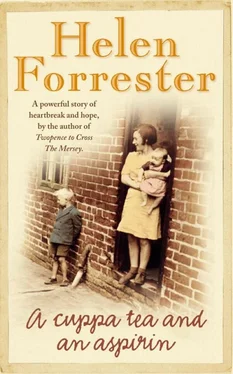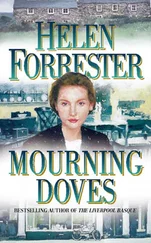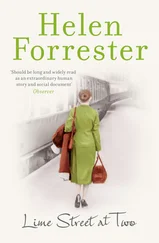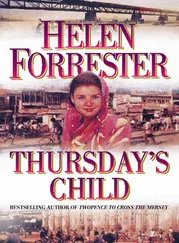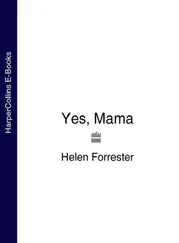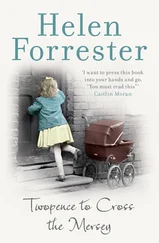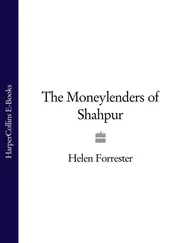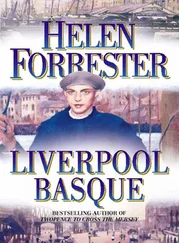The clumsy-looking box radio, however, brought him unexpected friends. If he was feeling well enough, all the children in the house were welcome to come into the room to sit cross-legged on the bare wooden floor to listen, in fascinated silence, to the Children’s Hour. It might have been broadcast from outer space for all the connection it had with their own lives, but they loved the voice which actually said ‘Hello, children’ and ‘Happy Birthday’ to them.
In addition, their fathers could, sometimes, get early information from Mike regarding the outcome of a football match or a horse race, on which they had bet. Mary Margaret loved nothing better than to listen to the distant music which drifted down the stairs into her room, though her husband, Thomas, grumbled incessantly about it.
Determined to see the bright side, patient Mary Margaret said frequently that it could be worse. The house was not nearly as crowded as it used to be, and, just think, they could be without a roof at all! Or she could be like the old fellow, who lived in the dirt-floored cellar, a cellar which had been boarded up by the City Health Authority as unfit for human habitation.
Martha’s husband Patrick had helped the desperate old Irishman who now lived there to prise the door open.
‘But it’s an awful place to live,’ Martha had protested. ‘Every time it rains real hard, it gets flooded with the you-know-what from the lavatories, and then he’s got to sleep on the steps.’
‘He’s better off in the court than in the street,’ Patrick had argued, and Mary Margaret agreed with him. So Martha shrugged and accepted that you had to help people who were worse off than yourself.
On days when it did not rain, Martha Connolly, Alice Flynn, Mary Margaret Flanagan and her wizened mother, Theresa Gallagher, spent much of their time sitting on the front step, their black woollen shawls hunched round them, as they watched life proceed in the court. As the court was entirely enclosed by houses similar to the one they lived in, all equally crowded, there were plenty of comings and goings on which to speculate.
Until recently, they could have contemplated the midden in the centre of the court and the rubbish which was thrown into it, but the City had had it removed and replaced by lidded rubbish bins outside each house, which were not nearly so interesting to the many rats which infested the dockside.
The almost perpetual queue for the two choked lavatories at the far end of the court was a regular source of amusement. Each person stood impatiently, with a piece of newspaper in his hand, moaning constantly and with increasing urgency at the delay. On the filthy, paved floor of the court, the usually barefoot children of the Connollys and Flanagans relieved themselves in corners, and fought and played. The women intervened only when juvenile fights threatened to become lethal.
‘If you don’t stop that, I’ll tell your dad,’ the women would shriek. This awful threat implied a whipping with their father’s belt on a bare bottom, so it was usually effective.
Ownerless cats and, occasionally, a stray dog stalked rats and mice; and the children found big, dead rats endlessly engrossing.
By the narrow entry from the main street, men stood and smoked and argued. They read a single copy of the Evening Express between them, in order to keep up with the racing news, and also to work on the football pools. Like a ship’s crew, they tried not to quarrel, though not infrequently fist fights did break out. These scuffles, however, were more likely to occur outside the nearby pubs, when, drunk at closing time on a Saturday night, they were emptied out into the street, to be dealt with by the pair of constables on patrol.
Although it was remarkable how a rough kind of order prevailed amid such a hopelessly deprived little community, the younger men enjoyed nothing more than a Saturday night fight, particularly if the two unarmed police constables got involved. It formed a great subject of conversation on a Sunday morning, as they nursed their aching heads and black eyes.
Within the court itself, a family row was high theatre, which brought almost every inhabitant out to watch. When a woman being beaten hit back, the female onlookers frequently cheered her on. ‘Give it ’im, Annie – or Dolly – or May – love,’ they would shriek, joyously adding fuel to male rage.
As the four women sat together on their step, they did not seem to notice the general stench of the airless court or the rarity of a single beam of sunlight. Only when it rained or was too bitterly cold outside, did they seek the lesser cold of Martha’s room, which at least had a window – and a range which sometimes held a fire.
Martha was extremely protective of her frail friend, Mary Margaret. If she had a fire in the range, she would sit her close by it on the Connollys’ solitary wooden chair. She would then boil up old tea leaves to make a hot drink for her, which she laced with condensed milk from a tin. To add to her warmth, she would, sometimes, wrap round her knees the piece of blanket in which her youngest child, Number Nine, slept at night; or she would pat and rub her back when she was struck with a particularly violent bout of coughing.
As they gathered on the step, after the rescue of the councillor, Martha continued her doubts about him.
‘When we never heard nothing, Pat gave up hope, he did, ’specially when he saw the pitcher in the papers of the councillor and the boatman, and nothin’ about himself. And us havin’ to find him a new cap and scarf, an’ all. He lost his old ones when he dive in. And his boots was finished.’
Mary Margaret sighed: the loss of a cap and scarf was indeed serious, the lack of strong boots dreadful.
‘Never mind, love, he were a brave man to do what he done,’ she soothed. She was one of those blessed people who travel without hope, and could not, therefore, ever be disappointed. ‘You have to make the best of it,’ she advised, as she always did. ‘At least, neither of them got dragged under the landing stage by the current.’
‘Oh, aye. If they had, they would have both been drowneded – and without our Pat, it would be the workhouse for us, no doubt about it.’
For a moment, both were silenced by their permanent dread of this fate, despite the recent provision of outdoor relief by the City’s Public Assistance Committee. It was a traditional fear, which ranked close behind their horror of a pauper’s funeral.
Summer turned to foggy autumn and still they heard no more of the councillor.
Patrick grinned cynically, when Martha brought up the subject. ‘It’s to be expected,’ he told her. ‘Why should he remember? Folk like us never waste our time voting.’ He laughed. ‘We don’t mean nothin’ to nobody.’
He continued his usual dockside waits for work; he knew no other world.
Конец ознакомительного фрагмента.
Текст предоставлен ООО «ЛитРес».
Прочитайте эту книгу целиком, купив полную легальную версию на ЛитРес.
Безопасно оплатить книгу можно банковской картой Visa, MasterCard, Maestro, со счета мобильного телефона, с платежного терминала, в салоне МТС или Связной, через PayPal, WebMoney, Яндекс.Деньги, QIWI Кошелек, бонусными картами или другим удобным Вам способом.
